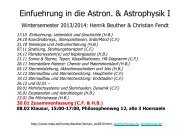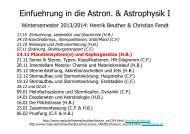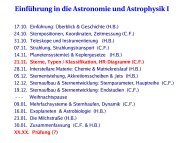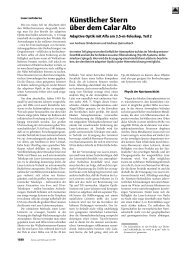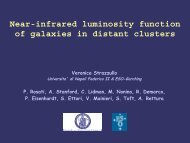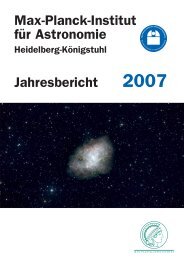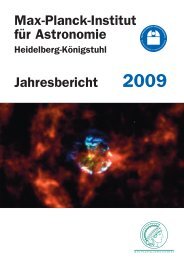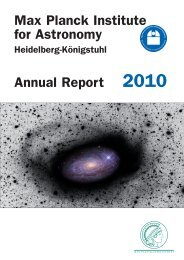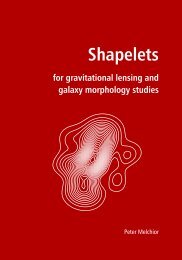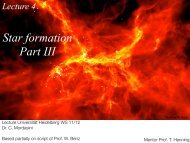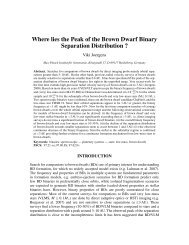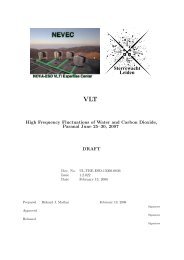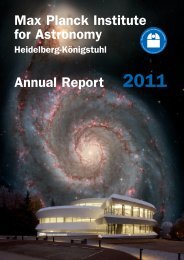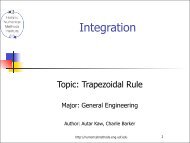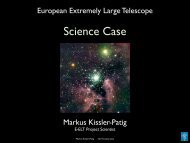Max Planck Institute for Astronomy - Annual Report 2005
Max Planck Institute for Astronomy - Annual Report 2005
Max Planck Institute for Astronomy - Annual Report 2005
You also want an ePaper? Increase the reach of your titles
YUMPU automatically turns print PDFs into web optimized ePapers that Google loves.
140 V. People and Events<br />
V.14 Where is the MPIA Standing in our Research Scene?<br />
An interview with Hermann-Friedrich Wagner, <strong>for</strong>mer<br />
Director in the Federal Ministry of Education and<br />
Research and Chair of the Board of Trustees at the<br />
MPIA.<br />
Hermann-Friedrich Wagner has been involved with<br />
astronomy <strong>for</strong> at least half a century. At the age of 12<br />
he built his first telescope. In 1960, he began to study<br />
physics and astronomy at the University of Tübingen,<br />
attending Heinrich Siedentopf’s lectures there. There<br />
he also met Hans Elsässer, the later founding director of<br />
the MPIA, who in 1959 had habilitated with Siedentopf.<br />
But then Mr. Wagner switched over to the booming<br />
field of nuclear physics where he earned his PhD in<br />
1969 in Bonn. From 1970 to 1972 he held a chair in the<br />
faculty of physics at the University of Kabul. After that<br />
he first worked <strong>for</strong> the Federal Ministry of Economic<br />
Cooperation and Development and then in the Federal<br />
Ministry of Education and Research. There he worked<br />
<strong>for</strong> large research centers and was engaged in energy<br />
research <strong>for</strong> a long time. From 1998 until <strong>2005</strong> he then<br />
was responsible <strong>for</strong> the allocation of funds <strong>for</strong> basic<br />
scientific research. In this interview, Mr. Wagner comments<br />
on the position of the MPIA in the national and<br />
international environment and gives his assessment of<br />
the future prospects of astronomical research on the one<br />
hand and the chances of astronomers on the job market<br />
in a high-tech country like Germany on the other.<br />
Since when do you know the Königstuhl?<br />
HFW: I first came to the Königstuhl in 1962 when<br />
Siedentopf invited us students there. There was no talk<br />
of the MPIA and its large telescopes then (the foundation<br />
of the <strong>Institute</strong> was not decided upon until 1967),<br />
but Hans Elsässer had just been appointed director of<br />
the Landessternwarte.<br />
You then decided against a PhD in astronomy.<br />
Why?<br />
HFW: One single argument had been the decisive factor<br />
then: I considered the career prospects of astronomers<br />
to be very poor, and I there<strong>for</strong>e joined the nuclear physicists,<br />
although I felt very much tempted to do a PhD<br />
with Professor Priester in Bonn. The largest telescope<br />
in the Federal Republic of Germany then was the 1-m<br />
reflector in Hamburg-Bergedorf (built in 1910!), and<br />
only very few people were dreaming of space astronomy.<br />
I even remember Siedentopf proving down to the<br />
last detail why it never would be possible to build space<br />
telescopes. He had been firmly convinced that it was<br />
impossible to receive the signals with sufficient clarity.<br />
»Forget signal reception from Mars«, he told us. Today<br />
it is obvious how much Siedentopf was mistaken in this<br />
respect.<br />
And how do you see your decision from a presentday<br />
point of view?<br />
HFW: I had no idea then of the meteoric development<br />
awaiting astronomy in our country. Those who are still<br />
thinking the way I did then are strongly mistaken. Young<br />
astrophysicists generally get an excellent education in<br />
the high-tech and in<strong>for</strong>mation technology area, that is,<br />
exactly in those fields that are very much in demand<br />
today. At that time I thought astronomy was just <strong>for</strong><br />
fun. Current astrophysics is <strong>for</strong> fun and has excellent<br />
career prospects – that is its big advantage. Solid state<br />
physicists, I think, are fixated on too narrow a field, so<br />
maybe they will be able to do solid state physics later<br />
with Siemens. Astrophysicists, however, have a broad<br />
education and can do all sorts of things.<br />
Where would you place present-day astrophysics in<br />
the sequence of other physical research areas?<br />
HFW: For me, astrophysics is the most interesting field<br />
of all. After all, which field of research is providing more<br />
excitement then?<br />
Do you also support the building of new large telescopes?<br />
HFW: Absolutely. I always considered telescopes to be<br />
»discovery machines«. If you have a telescope more powerful<br />
than its predecessors you will always find something<br />
new with it. You never can be sure what it will be,<br />
but you will always come across something new. That is<br />
the fascinating thing <strong>for</strong> me. In comparison, a large-scale<br />
particle accelerator like the LHC of cern is a dedicated<br />
facility used to search <strong>for</strong> something specific, as if you<br />
were looking <strong>for</strong> the sea route to India. This is why I<br />
supported the LBT from the start, or now the new X-ray<br />
laser X-FEL at desy.<br />
A large number of young people are being educated<br />
at observatories like that.<br />
HFW: Exactly. Only people who have a certain love of<br />
adventure and are really good will go there. And they are<br />
getting an excellent training – exactly what the German<br />
industry needs.<br />
So, more money <strong>for</strong> large observatories like the LBT<br />
in the future?<br />
HFW: Absolutely. The tough competition found at such<br />
an institution ensures that only the very best students get



